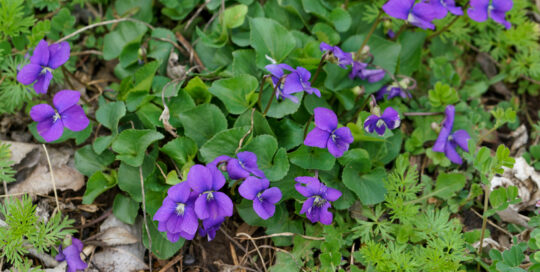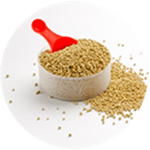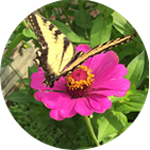Some advice about Japanese honeysuckle
Views: 4919
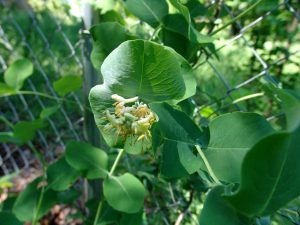
My best friend tried to warn me, “You really don’t want that plant in your yard.” But I’ve always loved the fragrance of Japanese honeysuckle, and hummingbirds seem to use them, and cardinals nest in them. I love low maintenance plants that are hard to kill. It was planted by my mother-in-law! I thought, what could go wrong?
It turns out, a lot.
I have many “heirloom” plants in my yard. They aren’t heirlooms in the botanical sense; rather, they are plants with sentimental value because I got them from relatives. For example, I have two roses that were originally planted by my grandmother. They have followed me through two moves because I just can’t let them go. I still think of Grandma when her roses are blooming. Similarly, when it came time to sell my mother-in-law’s old farmstead, we went and dug up everything we could: roses, four o’clocks, garden phlox, day lilies, bearded iris, and even a Japanese honeysuckle bush.
Unfortunately, I wish I’d left the honeysuckle behind.
In my yard, in less than five years, my Lonicera japonica went from, “Yay, honeysuckle!” to “Whoa, now, where are you going?” to “Stop! Stop! You must be stopped, now!” It escaped my fence and is starting to suffocate my woodland floor. It chokes seedlings, prevents wildflowers from growing, and is basically strangulating anything that might otherwise attempt to grow in my lovely woods.
Unfortunately, this problem is not isolated to my three acres in Oklahoma. Japanese honeysuckle and Asian bush honeysuckles are invasive. Many states classify them as noxious weeds. In some areas, Japanese and Asian honeysuckle is taking over entire forests, a smiling, divinely-scented version of kudzu, with better cold tolerance. While less harmful in urban environments, it can still take over a small, backyard garden.
My belief that it was helpful to wildlife was sadly misplaced. By choking out natives, invasive honeysuckle destroys biodiversity and removes important food sources. It’s relatively pest free, so it doesn’t even support native insects that might feed birds. Noxious weeds, indeed.
I’m not entirely sure how to get rid of my Japanese honeysuckle without using herbicides, which I am loath to do. It may be a matter of time-intensive cutting, pulling, and pruning, but I think I’ve already lost the war. It has invaded and literally taken root.
Fortunately, there are great alternatives if you’d like native replacements for foreign honeysuckle. I have two natives in my yard: Lonicera sempervirens, also known as coral or trumpet honeysuckle and Lonicera reticulata, a grape honeysuckle, specifically, a variety known as Kintzley’s Ghost.
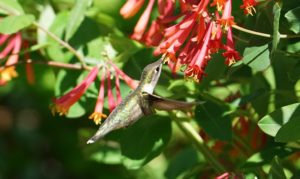
Ruby-throated hummingbird feeding on coral honeysuckle.
I have one coral honeysuckle on my front fence at the top of my yard. It is very inhospitable territory: sandy soil, full afternoon sun in July and August. The ground slopes. It literally roasts in summer, and we can go for weeks without rain. I had to water it occasionally the first year, and I haven’t had to water it since. Hummingbirds love it. I also have one in more hospitable territory on my back fence in partial shade. It has spread a bit more than the one at the top of the yard, and it is equally beautiful. Both bloom intermittently all season.
Last year, I planted a Kintzley’s Ghost (see photo). It is very unusual with its silvery, round leaves, and quite beautiful. I have been coddling it, but I’m not sure it really needs it. This spring, it has taken off. I haven’t seen hummingbirds on it, but that’s probably just bad timing; I’m sure they are using it.
If you’re thinking of planting Japanese (or Asian) honeysuckle this year, I’ll pass on some advice that I wish I’d heeded: “You don’t want that plant in your yard.” Instead, plant a native.
Meet Leslie Miller
Leslie Ann Miller shares 3.5 acres in rural Oklahoma with birds, butterflies and wide variety of animals. She is currently transforming her yard with plantings…
Leslie's Recent Posts
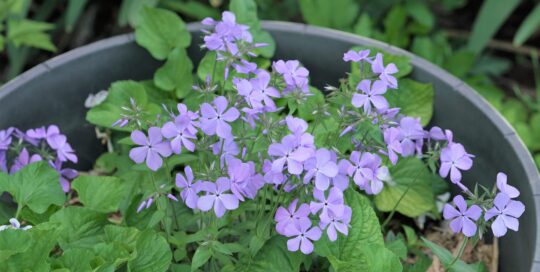
Early spring is time to plant native spring ephemerals
